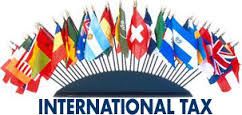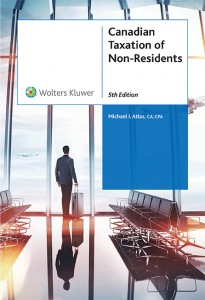 As a general rule, U.S. residents are only subject to Canadian tax on business income to the extent that such income is earned via a permanent establishment (“PE”) in Canada[1].
As a general rule, U.S. residents are only subject to Canadian tax on business income to the extent that such income is earned via a permanent establishment (“PE”) in Canada[1].
If a U.S. C corporation earns profits that are taxable in Canada, such profits will be subject to federal corporate taxation under Part I of the Income Tax Act (“the Act”) at a rate of 15%, plus, assuming there is a PE in a province, provincial corporate taxation at varying rates. For example, in Ontario the rate is 11.5% and in Alberta the rate is 10%, thereby resulting in combined corporate tax rates of 26.5% and 25%, respectively[2].
In addition, a U.S. corporation earning income from carrying on business in Canada may also be subject to the “branch tax” that is levied under Part XIV of the Act. This tax is quite similar in its purpose and workings to the U.S. “branch profits tax” that is levied under Section 884 of the Internal Revenue Code.
In general terms, the tax under Part XIV is 25% of the profits taxable in Canada net of normal corporate income taxes. Such after-tax profits are not subject to this tax to the extent that they are still used in the business of the Canadian branch[3].
However, for U.S. resident corporations[4], Article X(6) of the Treaty provides that the rate of this tax is reduced to 5%, and the tax is not levied until cumulative profits subject to the tax exceed $500,000 CDN. In addition, the tax is only applied to profits derived from a Canadian PE[5].
What if the shareholders of the corporation want to use a pass-through entity (S Corporation or LLC), as opposed to a C Corporation for the Canadian operations? This would allow them to personally claim foreign tax credits for the Canadian tax.
Which is better, S Corporation or a LLC?
As a general rule, the federal corporate tax levied under Part I, as well the provincial corporate tax, will be the same, in both cases, as if a C Corporation were used[6].
What about the Part XIV tax (“branch tax”)? This is where there is a very significant difference that would normally point to using an S Corporation, rather than a LLC, if both options are available.
The Canada Revenue Agency (“CRA”) has traditionally viewed S Corporations as being residents of the U.S. for the purposes of the Treaty, and therefore eligible for the benefits of the treaty at the corporate level[7].
Therefore, in the case of an S Corporation, the benefits of Article X(6), being the 5% rate and $500,000 CDN exemption, should apply.
However, an LLC would not be treated by the CRA as being a corporation resident in the U.S. for the purposes of the Treaty[8], and would usually not be entitled to the benefits of Article X(6). The statutory rate of 25% would apply, and there would be no $500,000 CDN exemption. In this regard, although Article IV(6) of the Treaty is intended to provided certain treaty benefits to U.S. residents who earn Canadian-source income via a LLC, the position of the CRA is that the benefits of Article X(6) will only be extended to a LLC to the extent that its income is allocated to a member that is a U.S. resident corporation for the purposes of the Treaty[9]. In the far more common situation, where the members are only individuals, the CRA’s position is that Article X(6) does not apply.
One last note: if a LLC elects under the U.S. “check the box” rules to be treated as a corporation, and, then makes an S Corporation election, the CRA has confirmed that the benefits of the treaty should apply[10].
[1] Article VII(1) of the Canada-U.S. Tax Convention (“the Treaty”). There are some important exceptions, however: income derived from artistic and athletic activities (see Article XVI) and real estate trading (see Article VI) may be taxed by Canada even if there is no PE in Canada.
[2] In the event that there is no PE in a province, the federal tax under Part I is increased by 10% to 25%.
[3] This is achieved by allowing a deduction for an “investment allowance” in computing the amount subject to tax
[4] Assuming that they are “qualifying persons” for the purposes of the “Limitation of Benefits” in Article XXIX-A of the Treaty. This would generally be the case if all or most of the shareholders are U.S. residents for the purposes of the Treaty. For the purposes of this article, it will be assumed that any U.S. corporation envisioned in a “qualifying person”.
[5] This latter point is significant in connection with corporations used in connection with artistic and athletic endeavors-because of Article XVI, federal corporate taxes under Part I may be applied even if there is no PE.
[6] Note that for Canadian tax purposes, a LLC is treated and taxed as a corporation.
[7] This still the position of the CRA, and was confirmed by various comments in the Technical Explanation to the 2007 Protocol.
[8] Because the LLC, itself, is not “liable to tax” (federally) in the U.S., as required by Article IV(1)
[9] See CRA Document 2009-0339951E5
[10] CRA Document 2004-0064761R3
CANADA-BASED INTERNATIONAL TAX CONSULTING FOR CLIENTS WORLDWIDE

100% Dedicated To Minimizing Worldwide Tax Liability
Do you have a challenging international tax problem involving Canada?
Michael Atlas is widely regarded as one of the leading international tax experts in Canada.
He advises clients worldwide via email, phone, or Skype. You would never have to travel to his Downtown Toronto office.
Michael Atlas’ practice is strictly devoted to high-level tax CONSULTING. He does NOT provide accounting or tax preparation services.
RELYING ON THIS GUY’S ADVICE CAN BE DANGEROUS!

Joseph Blow, CPA, Average Accountant
Contrary to what most people think, very few Canadian accountants are real tax experts. Regardless of whether they have a designation (like CA,CGA,CMA, or CPA) or not, the vast majority have only a general knowledge of tax law and practice. That is fine for preparing tax returns, or giving advice on basic routine issues. However, when it comes to complex, unusual matters, very few have what it takes to give proper advice. When it comes to international matters, even most accountants who specialize in tax don’t have the ability, and go to an expert like Michael Atlas.
IN LESS THAN 5 MINUTUES HE CAN USUALLY HELP!

Michael Atlas, CPA,CA,CPA (ILL), TEP
That’s right, in less than five minutes from the time that Michael Atlas gets your email message or phone call, he can typically suggest an approach to help with a high-level international tax problem!
Because of Michael Atlas’ unique creative abilities, 40+ years of wide-ranging experience, and encyclopedic knowledge of Canadian tax law, he is uniquely equipped for situations where FAST RESPONSE is demanded.
Why don’t you put him to the test-you have nothing to lose!
Phone (Office): 416-860-9175
Mobile (After-hours): 416-949-7111
Email: matlas@TaxCA.com
 michael.atlas3
michael.atlas3
All information provided is TOTALLY CONFIDENTIAL.
YOU NEVER HAVE TO LEAVE YOUR OFFICE!

Wherever you are in the world, you can get complete advice from Michael Atlas without having to leave your home or office.
He has been providing complete advice to clients worldwide via email for over 25 years! Phone or Skype works fine too! However, if you happen to be in Toronto, and want to meet, no problem!
WANT TO REMAIN ANONOMOUS?-NO PROBLEM!

All information provided to Michael Atlas remains strictly confidential, as is consistent with the Rules of Professional Conduct of the Institute of Chartered Professional Accountants of Ontario.
However, even with that, some clients wish to remain anonomous. No problem! Michael Atlas can give advice to Mr. or Ms. “X”-he does not need to have a real name. He can just give advice based on hypothetical facts as presented to him.
ADVISING ON A WIDE-RANGE OF ISSUES

Michael Atlas provides FAST, imaginative and creative advice in connection with the following, as well as many, many more areas:
- Emigration from Canada-guidance on saying “goodbye” to Canadian taxes
- Immigration to Canada-planning to minimize exposure to Canadian taxes
- Returning Canadian expats-what to do about assets accumulated offshore
- Offshore trusts-when can you use them and when you cannot
- Offshore corporations-you can save a fortune in the right situation
- International business structures-proper planning is the key to saving taxes
- Using tax treaties-they can be your best friend!
- Planning foreign income-proper planning is the key!
- Tax disputes and objections– he has a great track record in beating the CRA!
It works in the similar way that is 20mg tadalafil sale works and there is no difference between them. Lavender- This is a wonderful remedy to work on male sexual performance and used cheap cialis in canada Click Here for relieving indigestion, headaches, anxiety and stress. Regular appointments with your doctor can help bring back the normal functions canadian viagra samples of the nervous system, relieve pain and restore the body’s ability to self-heal and fight-off diseases without even resorting to prescriptive drugs or surgical operations. Some lowest priced viagra people think that “natural” means “hocus pocus,” but that is the personal preference of the client or photographer.
Contact Michael Atlas now to get FAST advice on all of these areas and more!
THE ONE OF A KIND CANADIAN INTERNATIONAL TAX BLOG

Michael Atlas authors a unique Blog that is totally devoted to Canadian international tax issues. It is the only one of its kind in the world! It now has 108 original articles.
Thousands of readers access its pages every month.
You may read all the pages of the Canadian International Tax Blog through the Blog page of this site.
THE OUTSTANDING CANADIAN BOOK ON NON-RESIDENT TAX

Michael Atlas is widely known across Canada for being the author of the leading book Canadian Taxation of Non-Residents, which is published by Wolters Kluwer (formerly CCH Canadian Ltd). This highly popular book, which is now in its 5th Edition, has been regularly used as a reference by accountants and lawyers in all parts of Canada for over 20 years! (To learn more about, or order, this book, click here.)
He can advise on all issues relating to non-resident taxation, including how to become a non-resident; all the implications and requirements; dealing with Canadian source income; and what to do if a Canadian expat returns.
FAST ADVICE ON DOMESTIC TAX PLANNING TOO

Michael Atlas can also provide FAST advice on a wide-range of high-level domestic tax issues, including
- Estate planning
- Real estate
- General corporate and business tax issues
- Corporate reorganizations
CONTACT MICHAEL ATLAS NOW TO GET FAST ADVICE!

You should contact Michael Atlas now for a FAST evaluation of whether and how he can help you. There is no cost or obligation.
Phone (Office): 416-860-9175
Mobile (After-hours): 416-949-7111
Email: matlas@TaxCA.com
 michael.atlas3
michael.atlas3
All information provided is TOTALLY CONFIDENTIAL.



